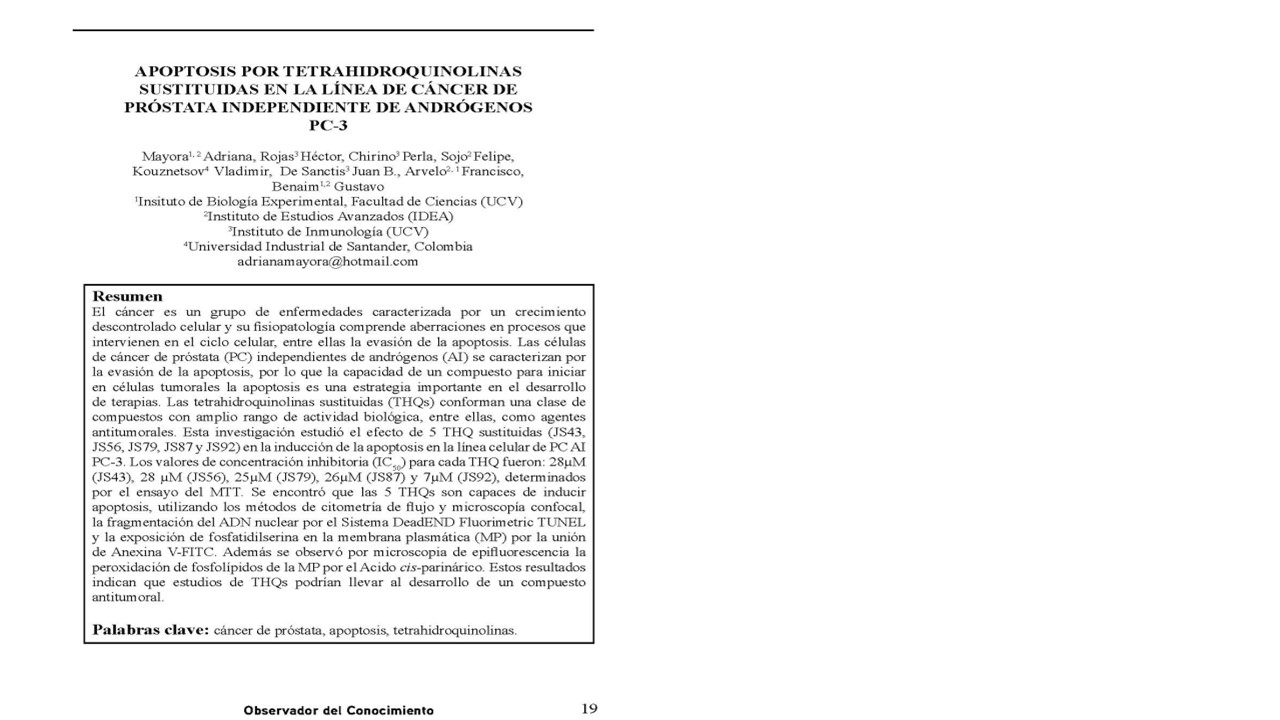Apoptosis by Substituted Tetrahydroquinolines in the Androgen-Independent Prostate Cancer Line PC-3
Keywords:
Prostate cáncer, apoptosis, tetrahydroquinolinesAbstract
Cancer is a group of diseases characterized by uncontrolled cell growth and its pathophysiology includes aberrations in processes that intervene in the cell cycle, including the evasion of apoptosis. Androgen-independent (AI) prostate cancer (PC) cells are characterized by the evasion of apoptosis, so the ability of a compound to initiate apoptosis in tumor cells is an important strategy in the development of therapies. Substituted tetrahydroquinolines (THQs) make up a class of compounds with a wide range of biological activity, including as antitumor agents. This research studied the effect of 5 substituted THQs (JS43, JS56, JS79, JS87 and JS92) on the induction of apoptosis in the PC AI cell line PC-3.
Downloads
References
Capote Negrin, L. (2006). Aspectos epidemiológicos del cáncer en Venezuela. Rev. Venez. Oncol. 18: 269- 281.
Crawford, E. (2003). Epidemiology of prostate cancer. Urology: 62: 3-12.
Fabisiak, J.P.; Tyurin, V.A.; Tyurina, Y.Y.; Sedlov, A.; Lazo, J.S.; Kagan, V.E. (2000). Nitric oxide dissociates lipid oxidation from apoptosis and phosphatidylserine externalization during oxidative stress. Biochemistry. 39(1):127-38.
Jemal, A.; Siegel, R.; Ward, E.; Murria, T.; Xu, J.; Smigal, C. (2006). Cancer statistics. Cancer J: Clin. 56: 106-130.
Khan, M. (2007). Quinoline analogs as Antiangiogenic Agent and Telomerase Inhibitors. Top. Heterocycl. Chem. 11:213-229.
Kouznetsov, V.; Merchan, A.; Arvelo, F.; Bello, J.; Sojo, F.; Muñoz, A. (2010). 4-Hydroxy-3-methoxyphenyl Substituted 3-methyl-tetrahydroquino-line Derivatives Obtained Through Imino Diels-Alder Reactions as Potential Antitumoral Agents. Letters in Drug Design & Discovery. 7:632-639.
Mayora, A.; Arvelo, F. (2011). Cáncer de próstata y apoptosis. Invest Clin. 52: 376 -396.
McDonnell, T.; Troncoso, P.; Brisbay, S. (1992). Expression of the protooncogen bcl-2 in the prostate and its association with emergente of androgen-independent prostate cancer. Cancer Res. 52: 6240- 6244.
Miltenyi Biotec. (2011), [en línea], de http//www.miltenyibiotec.com/ d o w n l o a d / d a t a s h e e t s _ e n / 3 6 3 / MiltenyiBiotecDataSheet_Annexin-V-FITC-Kit_130-092-052.pdf.
Mosmann, T. (1983). Rapid colorimetric assay for cellular growth and survival: application to proliferation and cytotoxicity assays. Journal of Immunological Methods. 65: 55-63.
Plati, J.; Bucur, O.; Khosravi-Far, R. (2008). Dysregulation of apoptotic signaling in cancer: Molecular mechanisms and therapeutic opportunities. J Cell Biochem; 104: 1124-1149.
Promega. (2011), [en línea], de http:// www.promega.com/products/cell-health-assays/apoptosis/tunel-assays.
Reed, J. (2003). Apoptosis-targeted therapies for cancer. Cancer Cell. 3: 17- 22.

Downloads
Published
How to Cite
Issue
Section
License

This work is licensed under a Creative Commons Attribution-NoDerivatives 4.0 International License.







